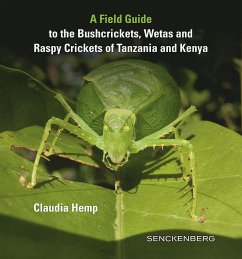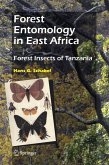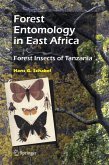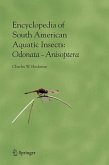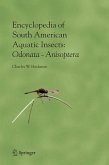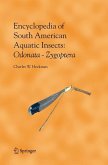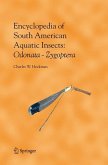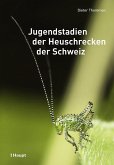This field guide covers northern to central Tanzania, southern Kenya and parts of central Kenya. Most species are illustrated by live specimens; generally, adult males and females are depicted, along with selected nymphal stages. For species-rich genera, morphological details are provided, together with keys to genera and species as well as distribution maps for most taxa. The enclosed DVD features the songs of 185 species.
More than 270 bushcricket species are treated, including raspy crickets (7 genera) and wetas (2 genera). The majority of the species shown are from the family Tettigoniidae, particularly from the subfamily Conocephalinae (including the tribes Agraeciini, Conocephalini and Copiphorini); in addition, the subfamilies Hetrodinae, Hexacentrinae, Meconematinae, Saginae, and Mecopodinae are represented as well. The subfamily Phaneropterinae is the most diverse in the area, with six genera in the tribe Acrometopini, plus representatives of the tribes Amblycoryphini, Catoptropterigini, Ducetiini, Holochlorini, Odonturini, Otiaphysini, Pardalotini, Phaneropterini, Terpnistrini and Tylopsidini. Genera of ungrouped Phaneropterinae in the area include Ectomoptera, Eulioptera, Euryastes, Lunidia, Materuana, Meruterrana, Oxyecous, Pseudopreussia, Sentia and Tropidonotacris. The subfamily Pseudophyllinae is also present with six genera (Acauloplax, Cymatomera, Cymatomerella, Pseudotomias, Stenampyx and Zabalius).
More than 270 bushcricket species are treated, including raspy crickets (7 genera) and wetas (2 genera). The majority of the species shown are from the family Tettigoniidae, particularly from the subfamily Conocephalinae (including the tribes Agraeciini, Conocephalini and Copiphorini); in addition, the subfamilies Hetrodinae, Hexacentrinae, Meconematinae, Saginae, and Mecopodinae are represented as well. The subfamily Phaneropterinae is the most diverse in the area, with six genera in the tribe Acrometopini, plus representatives of the tribes Amblycoryphini, Catoptropterigini, Ducetiini, Holochlorini, Odonturini, Otiaphysini, Pardalotini, Phaneropterini, Terpnistrini and Tylopsidini. Genera of ungrouped Phaneropterinae in the area include Ectomoptera, Eulioptera, Euryastes, Lunidia, Materuana, Meruterrana, Oxyecous, Pseudopreussia, Sentia and Tropidonotacris. The subfamily Pseudophyllinae is also present with six genera (Acauloplax, Cymatomera, Cymatomerella, Pseudotomias, Stenampyx and Zabalius).

